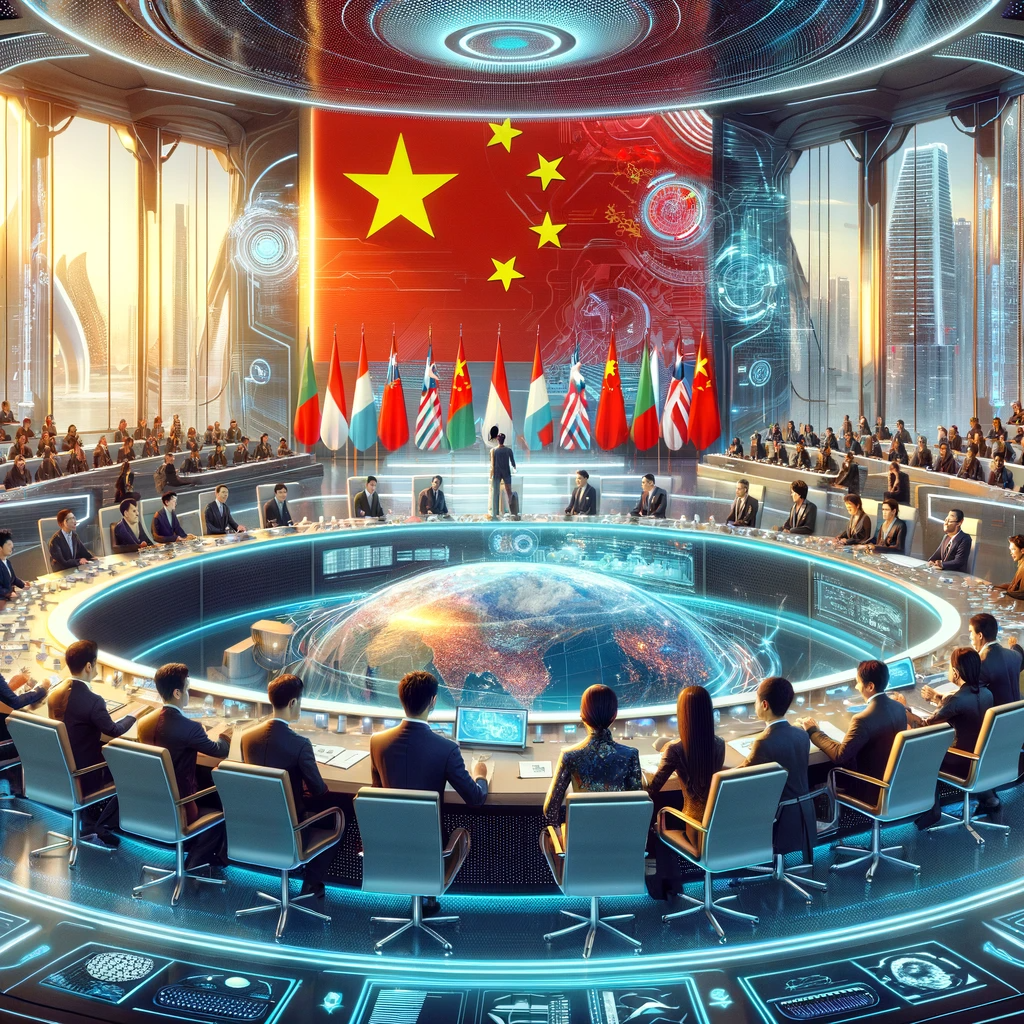Muhammad Asif Noor
As the world grapples with unprecedented challenges of war, climate change, and growing conflicts, China has emerged as a steadfast proponent of fostering an equal and orderly multipolar world and promoting universally beneficial and inclusive economic globalization.
The recently held Central Conference on Work Relating to Foreign Affairs, presided over by President Xi Jinping has not only outlined the achievements of the past decade but has also set the tone for the nation’s future engagement on the international stage.
China’s diplomatic precision is geared towards not only safeguarding its national interests but also contributing to a world where nations collaborate for the greater good.
China’s diplomatic strategies provide a roadmap for engagement that is rooted in principles, adaptive to change, and poised to navigate the complexities of the evolving global landscape.
At the heart of China’s foreign policy are its core interests, considered as non-negotiable red lines that underpin the nation’s stability and development.
These encompass maintaining the authority of the Communist Party, ensuring continued social and economic growth, and preserving sovereignty and territorial integrity.
China’s steadfast commitment to these core interests signifies its intent to safeguard its political system, economic progress, and national sovereignty, setting the parameters for international engagement.
As the world undergoes unprecedented changes, President Xi’s roadmap for the future of China’s diplomacy takes center stage.
Upholding principles, shouldering responsibilities as a major country, applying systems thinking, balancing tradition with innovation, maintaining a fighting spirit, and leveraging institutional strengths are identified as imperative principles for China’s foreign affairs in the coming periods.
However, amidst these imperatives lies the recognition that the world is entering a new period of turbulence and transformation.
As major issues and challenges emerged, China as an global important player felt the need for a clear and firm stance on global matters, championing the international moral high ground, and rallying the majority of nations toward collective solutions.
China’s foreign policy aspirations extend beyond conventional power dynamics, focusing on promoting world peace, fostering common development, and constructing a community with a shared future for mankind.
In evaluating the outcomes of the conference, China’s diplomatic trajectory appears poised to navigate both challenges and opportunities on the global stage.
The development and implementation of Xi Jinping’s Thought on Diplomacy have undoubtedly played a pivotal role in shaping China’s distinctive diplomatic style.
The stress on confidence, self-reliance, openness, and inclusiveness paints a picture of a major country with a global vision, ready to engage with the world on its terms.
Similarly, the emphasis on a community with a shared future for mankind echoes a commitment to collective well-being, transcending traditional power politics.
The call for an equal and orderly multipolar world aligns with a vision of a more stable and cooperative international order, challenging prevailing hegemonic structures.
China’s active participation in global governance, as emphasized in the conference, signifies a departure from mere economic engagement to a more comprehensive role in addressing shared challenges.
This involves reforms to the existing international system and order, positioning China as a constructive contributor to issues such as climate change, public health crises, and economic disparities.
The intent to foster a community of shared values is not only a diplomatic strategy but also a means to enhance China’s soft power and global influence.
The Belt and Road Initiative (BRI), highlighted in the conference, stands as a pivotal platform for action, symbolizing China’s commitment to global cooperation and connectivity.
Despite criticisms regarding its scale and influence, the BRI represents a diplomatic tool for building stronger ties, facilitating infrastructure development, and addressing shared challenges.
China’s dedication to refining and enhancing the quality of Belt and Road cooperation underscores its adaptability and responsiveness to evolving global dynamics.
China’s call for universally beneficial and inclusive economic globalization reflects a commitment to addressing global development imbalances.
The acknowledgment of the challenges posed by the global allocation of resources and the commitment to meet universal demands, especially from developing countries, sets a tone of responsibility.
This diplomatic stance reinforces China’s rejection of unilateralism and protectionism. The focus on trade and investment liberalization and facilitation is a pragmatic approach to overcoming structural challenges hindering the healthy development of the world economy.
The conference outcomes highlight China’s commitment to upholding fundamental principles while breaking new ground in its external work.
China’s external work is set to be guided by Xi Jinping’s Thoughts on Socialism with Chinese Characteristics for a New Era and Xi Jinping’s Thoughts on Diplomacy.
The emphasis on innovation, both in theory and practice, suggests a recognition of the evolving nature of global affairs.
As the world undergoes great transformations, China faces the task of balancing progress and stability, breaking new ground while upholding its fundamental principles.
It is evident that China is not merely reacting to global changes; it is actively shaping the narrative.
The Central Conference on Work Relating to Foreign Affairs offers a glimpse into China’s evolving diplomatic landscape. President Xi’s address outlines a roadmap that balances tradition with innovation, and national interests with global responsibility.
As China faces new strategic opportunities, building a community with a shared future for mankind remains at the forefront of its diplomatic endeavors.
In navigating a world marked by uncertainty, China stands poised to contribute significantly to a more inclusive, cooperative, and harmonious international order. The world watches as China, guided by its diplomatic principles, strives to shape a future marked by peace, prosperity, and progress for all.
*The writer is the Director Centre for BRI and China Studies- Institute of Peace and Diplomatic Studies
The Diplomatic Insight is a digital and print magazine focusing on diplomacy, defense, and development publishing since 2009.



